Are you looking for a fun and rewarding side hustle? Hosting wine tastings might be the perfect opportunity for you. Organizing and leading wine tasting events from the comfort of your own home can turn your passion for wine into a profitable venture. This exciting side gig allows you to share your knowledge and enthusiasm with others while earning extra income.
As a wine tasting host, you’ll have the chance to curate unique experiences for your guests.
You can invite friends and family to host in-home or virtual wine tastings.
At these tastings, you’ll guide them through a selection of wines, discussing flavors, aromas, and pairings.
It’s an excellent way to expand your social circle and build a network of wine enthusiasts.
Starting this side hustle is relatively simple.
You’ll need to acquire some basic knowledge about wines, invest in essential equipment, and develop your hosting skills.
With dedication and practice, you can create memorable events that keep your guests coming back for more.
Plus, you’ll have the flexibility to set your own schedule and work from anywhere, making it an ideal option for those seeking a balance between their passion and professional life.
Key Takeaways
- Wine tasting hosting offers a flexible and enjoyable way to earn extra income from home
- You can leverage your wine knowledge to create unique experiences for guests
- Building a network of wine enthusiasts can lead to growth opportunities in the industry
Exploring the Wine Industry
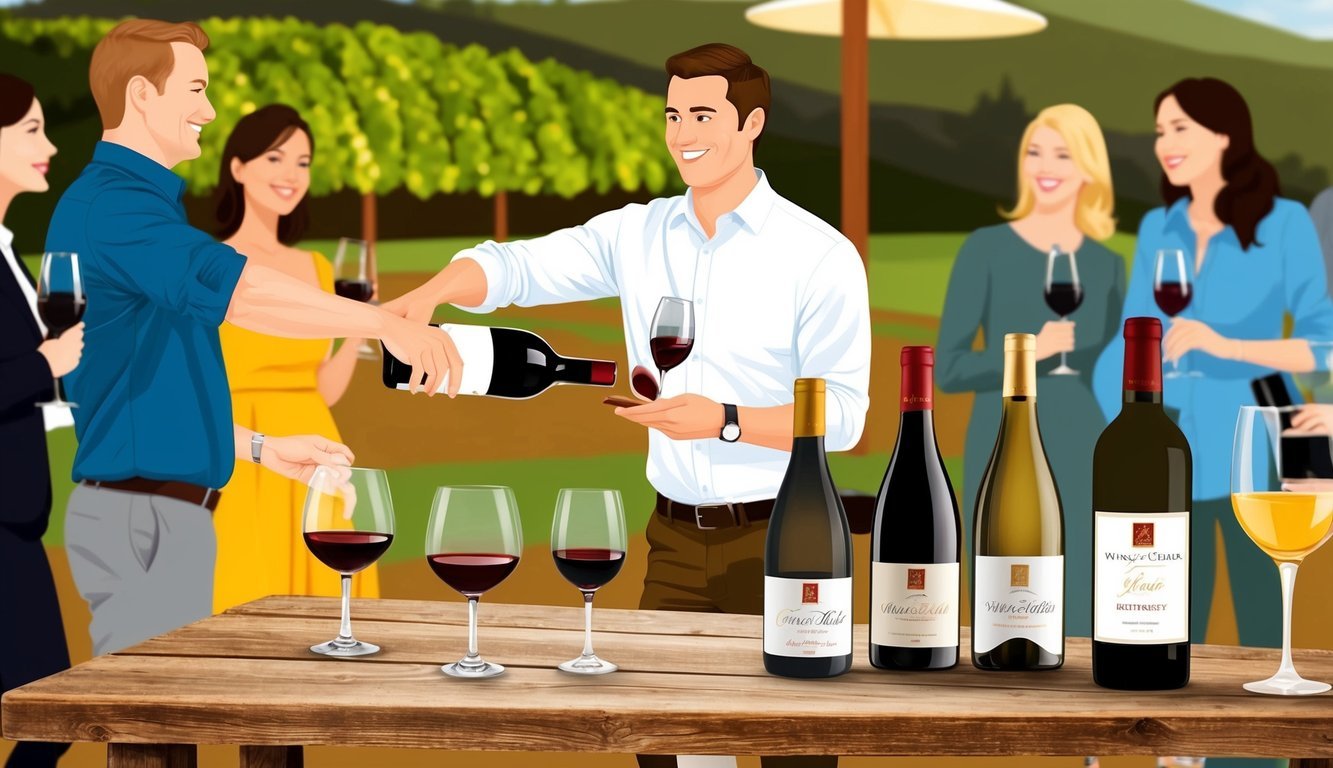
The wine industry has a rich history and continues to evolve with modern trends.
Understanding its cultural significance and current consumption patterns can provide valuable insights for aspiring wine tasting hosts.
History and Culture of Wine
Wine has been a part of human civilization for thousands of years.
Its origins can be traced back to the Caucasus region around 6,000 BCE.
Throughout history, wine has played significant roles in religious ceremonies, social gatherings, and culinary experiences.
You’ll find that different regions have developed unique wine-making traditions.
For example, France’s Bordeaux and Italy’s Tuscany are renowned for their distinct styles and flavors.
Wine has also influenced art, literature, and music across cultures.
Many famous paintings depict wine-related scenes, and countless books and songs celebrate its allure.
Current Trends in Wine Consumption
Today’s wine industry is experiencing exciting shifts in consumer preferences.
You’ll notice a growing interest in organic and biodynamic wines as people become more health-conscious and environmentally aware.
Natural wines, made with minimal intervention, are gaining popularity among younger drinkers. Virtual wine experiences have also emerged, allowing you to enjoy tastings from the comfort of your home.
Technology is reshaping the industry too.
Wine apps help you discover new varieties and track your preferences.
Some wineries are even using AI to optimize their production processes.
Sustainability is another key trend.
Many vineyards are adopting eco-friendly practices to reduce their carbon footprint and appeal to environmentally conscious consumers.
Basics of Wine Tasting

Wine tasting involves observing and evaluating the characteristics of different wines.
You’ll learn to identify flavors, aromas, and textures while developing your palate.
Hosting a tasting event allows you to share this experience with others.
Understanding Wine Attributes
When tasting wine, you’ll focus on four main aspects: appearance, aroma, taste, and finish.
Start by observing the wine’s color and clarity in your glass.
Then, swirl it gently to release the aromas and take a deep sniff.
As you sip, pay attention to the flavors and textures.
Is it sweet, dry, or somewhere in between? Notice the acidity, tannins, and body.
The finish refers to the lingering flavors after you swallow.
Practice describing what you taste.
Common wine descriptors include fruity, floral, earthy, or spicy.
Don’t worry about getting it “right” – your perception is unique to you.
Organizing a Tasting Event
To host a successful wine tasting, start with a theme.
You might choose wines from a specific region or grape variety.
Next, select 4-6 wines to compare, moving from lightest to fullest-bodied.
Provide proper glassware and consider creating tasting cards for guests to jot down notes.
Serve light snacks like bread or crackers to cleanse the palate between tastings.
Go from lightest to most full-bodied, lower alcohol to higher, and white to red.
This progression helps you appreciate each wine’s unique qualities.
Consider trying a blind tasting for added fun.
Cover the bottles and see if your guests can guess the varietals or regions.
Building Your Brand

Establishing a unique identity as a wine tasting host can set you apart and attract more clients.
A strong brand helps you connect with wine enthusiasts and grow your side hustle.
Creating a Wine Blog
Start a wine blog to showcase your expertise and passion.
Choose a catchy name that reflects your style and personality.
Write engaging content about wine varieties, tasting notes, and food pairings.
Share your experiences at wineries and tasting events.
Include high-quality photos of wines and vineyard visits.
Offer tips for hosting wine tastings at home.
Consistency is key.
Post regularly to keep your audience engaged.
Interact with readers through comments and social media to build a community around your brand.
Marketing Strategies for Hosts
Leverage social media platforms to expand your reach.
Create eye-catching posts featuring wine recommendations and tasting event highlights.
Use relevant hashtags to increase visibility.
Collaborate with local wineries and wine shops for cross-promotion opportunities.
Offer exclusive discounts to your followers to drive engagement and sales.
Consider creating short video content, such as wine tasting tutorials or quick reviews.
This can help you stand out in a crowded market and showcase your personality.
Network with other wine enthusiasts and industry professionals.
Attend wine events and join online communities to build relationships and gain referrals.
Crafting Wine Tasting Experiences
Creating memorable wine tasting events requires attention to detail and a passion for wine.
Your expertise in setting the mood and selecting the perfect wines will ensure your guests have an unforgettable experience.
Theme and Ambiance
Choose a theme that resonates with your guests.
You might opt for a regional focus, like Tuscan wines, or a varietal exploration, such as Cabernet Sauvignon from different terroirs.
Decorate your space to match the theme.
Consider lighting – soft, warm tones create an inviting atmosphere.
Background music should enhance, not overpower conversations.
Classical or jazz often work well for wine tastings.
Provide wine glasses appropriate for the types of wine you’ll be serving. Proper glassware can significantly impact the tasting experience.
Don’t forget palate cleansers like water crackers or bread.
These help reset taste buds between wines.
Curating Wine Selections
Start by determining how many wines you’ll feature.
Four to six is often ideal for a home tasting.
This allows guests to compare without overwhelming their palates.
Choose wines that tell a story or showcase specific characteristics.
You might select wines from the same grape but different regions to highlight terroir differences.
Consider your guests’ preferences and experience levels.
Include a mix of familiar and unique wines to keep things interesting.
Serve wines in a logical order, typically moving from light to full-bodied, dry to sweet.
This progression helps prevent palate fatigue.
Prepare tasting notes for each wine, including information on the winery, grape varieties, and flavor profiles.
This adds educational value to your tasting experience.
Legal Considerations
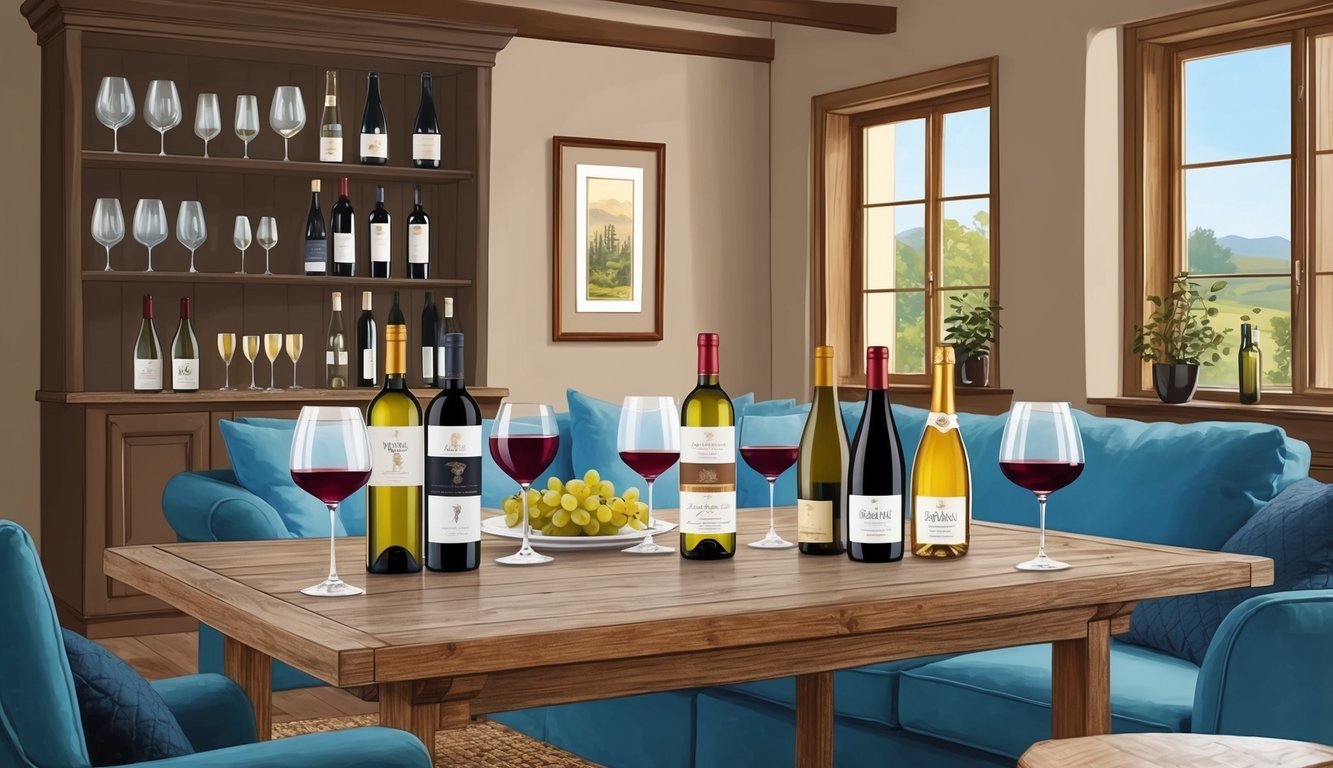
Starting a wine tasting host side hustle involves navigating several legal requirements.
You’ll need to obtain proper permits and licenses, as well as secure adequate insurance coverage to protect yourself and your business.
Permits and Licenses
To operate your wine tasting host side hustle legally, you’ll need to acquire specific permits and licenses.
Check with your local alcohol control board about requirements for serving alcohol.
You may need a liquor license or special event permit depending on your location and the nature of your events.
Some areas require food handling certifications if you’re serving snacks alongside wine.
Don’t forget about business licenses – even as a side hustle, you might need a general business permit from your city or county.
Research zoning laws if you plan to host events at home.
Some neighborhoods have restrictions on home-based businesses or events with multiple guests.
Liability and Insurance
Protecting yourself from potential legal issues is crucial in the wine industry.
Consider getting general liability insurance to cover accidents or injuries that might occur during your events.
This can safeguard you if a guest slips and falls or experiences an allergic reaction.
Look into professional liability insurance as well.
This can protect you if someone claims your advice or services caused them financial harm.
If you’re using your personal vehicle to transport wine or equipment, check if your auto insurance covers business use.
You might need additional coverage.
Don’t forget about protecting your intellectual property if you develop unique tasting methods or materials.
Trademarking your business name or copyrighting your tasting guides can be smart moves.
Setting Up Your Tasting Space
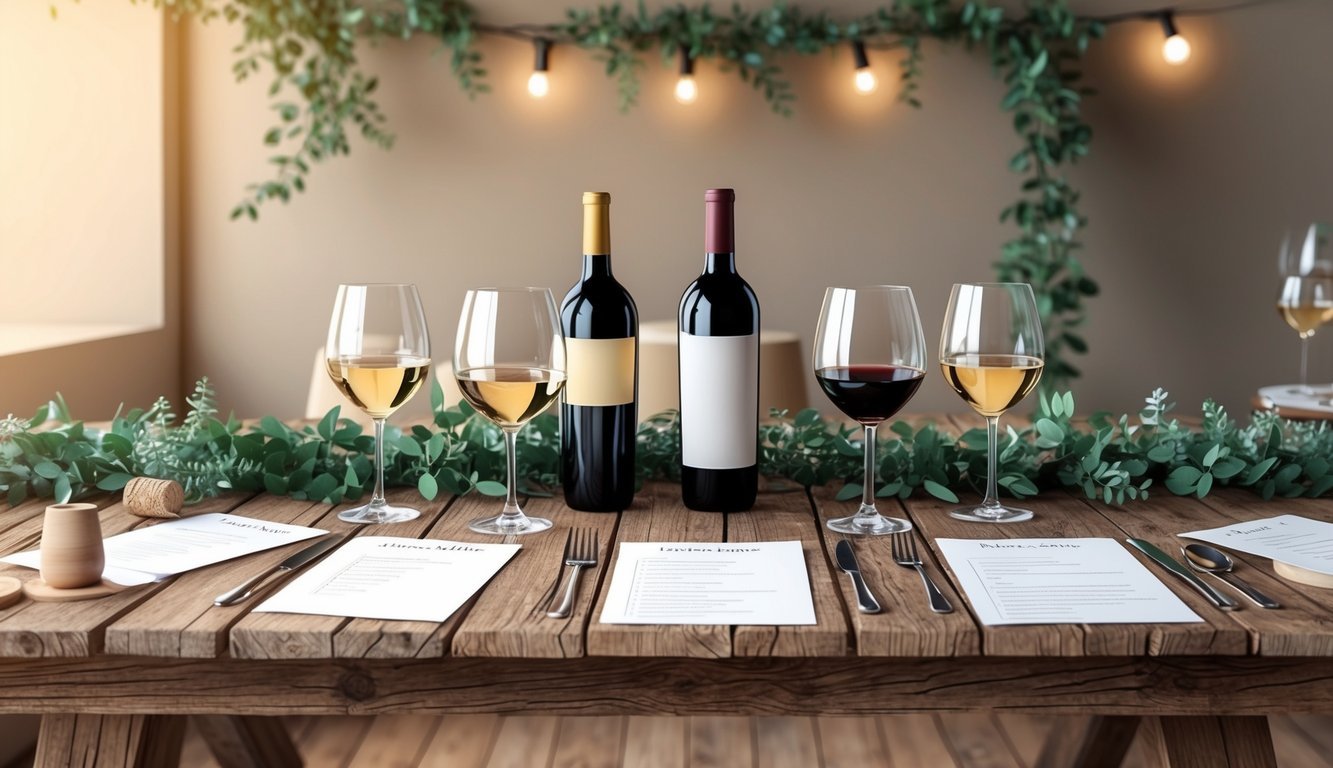
Creating the perfect ambiance for your wine tasting is crucial.
You’ll need to consider the location and gather essential supplies to ensure a smooth and enjoyable experience for your guests.
At Home or Offsite
Hosting at home offers comfort and convenience.
Choose a well-lit room with minimal distractions.
Your dining room or living room can work well.
Make sure there’s enough space for guests to move around and socialize.
For a more professional feel, consider renting a small event space.
Look for venues with proper lighting and temperature control.
Some local wineries or restaurants might offer private rooms perfect for tastings.
Remember to keep the area odor-free.
Strong smells can interfere with wine aromas. Avoid scented candles or cooking odors that might linger.
Essential Supplies
Start with quality glassware.
You’ll need enough wine glasses for each guest to taste 2 wines side-by-side.
Stemmed glasses are ideal, but stemless can work too.
Prepare a water station with glasses and pitchers.
Water helps cleanse palates between tastings.
Don’t forget wine openers, spittoons, and neutral crackers or bread as palate cleansers.
Provide notepads or scorecards for guests to jot down their thoughts.
This adds an interactive element to your tasting.
Consider small gift bags with these items as a thoughtful touch.
A white tablecloth can help guests see wine colors clearly.
Have napkins on hand for spills.
Lastly, prepare an ice bucket to keep white wines chilled if needed.
Financial Planning
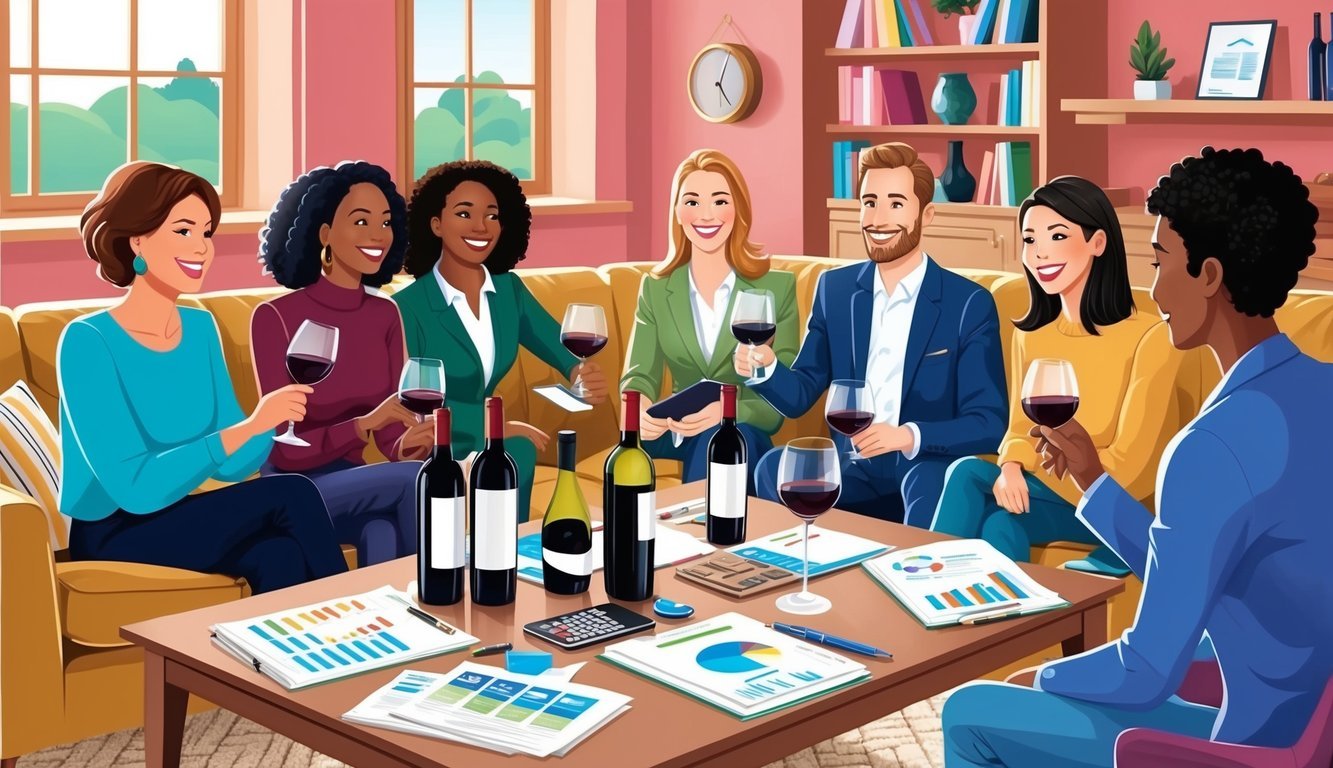
Proper financial planning is crucial for turning your wine tasting host side hustle into a profitable venture.
You’ll need to carefully consider how to price your services and manage your expenses to ensure long-term success.
Pricing Your Services
When setting your rates as a wine tasting host, consider factors like your expertise, the quality of wines you’ll be serving, and your target market.
Research what other hosts in your area charge to stay competitive.
You might offer tiered packages, such as:
- Basic tasting: $25-$35 per person
- Premium tasting: $40-$60 per person
- Luxury experience: $75-$100+ per person
Don’t forget to factor in your time for preparation and cleanup.
Consider offering discounts for larger groups or repeat clients to encourage bookings.
Be flexible with your pricing as you gain experience and reputation.
Managing Expenses and Profits
To keep your side hustle profitable, track all expenses meticulously.
Major costs include:
- Wine purchases
- Glassware and equipment
- Marketing materials
- Transportation
Set aside 20-30% of your earnings for taxes.
Aim for a profit margin of at least 30-40% after expenses.
Consider bulk purchasing wines to reduce costs, but be mindful of storage requirements.
Invest in quality, reusable equipment to save money long-term.
Use accounting software to track income and expenses.
This will help you identify areas to cut costs and maximize profits.
Don’t forget to set aside money for professional development and expanding your wine knowledge.
Networking in the Wine Community
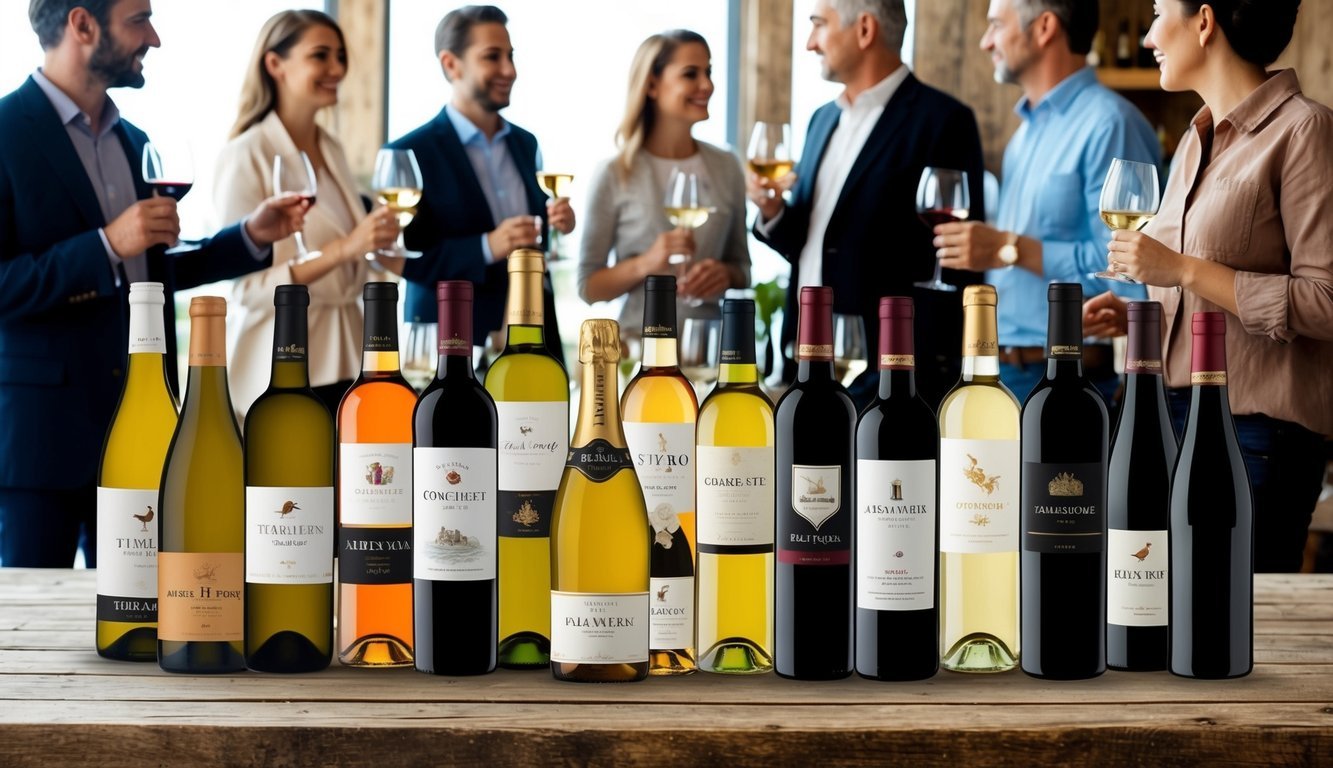
Building connections in the wine industry can open doors to exciting opportunities and enhance your wine tasting host side hustle.
You’ll gain valuable insights, discover new wines, and potentially find collaborators or clients.
Joining Wine Clubs and Associations
Wine clubs and associations offer excellent networking prospects.
You can become a member of local wine groups to meet fellow enthusiasts and industry professionals.
These organizations often host tastings, seminars, and social events where you can expand your knowledge and contacts.
Consider joining national associations like the Society of Wine Educators or the Wine & Spirit Education Trust.
They provide certifications that boost your credibility and connect you with a broader network of wine professionals.
Don’t forget online communities! Facebook groups and wine forums can be great places to share experiences, ask questions, and learn about industry trends.
Partnering With Wineries
Establishing relationships with wineries can significantly benefit your wine tasting host business.
Reach out to local wineries and offer to host tastings featuring their wines.
This can lead to mutually beneficial partnerships.
Tasting room work can be an excellent way to get your foot in the door.
You’ll gain insider knowledge about wine production and build rapport with winery staff and customers.
Consider organizing wine tasting events that showcase multiple wineries.
This approach allows you to network with various producers while providing value to your clients.
Remember to maintain professional relationships with your winery contacts.
Stay in touch, share feedback, and always represent their products accurately during your tastings.
Diversifying Your Side Hustle
Expanding your wine tasting host business can open up exciting new opportunities and income streams.
By branching out into related areas, you’ll enhance your expertise and appeal to a wider audience.
Pairing Food and Wine
Take your wine tasting events to the next level by introducing food pairings.
You can host tastings that focus on matching specific wines with complementary dishes.
Start with simple pairings like cheese and crackers, then progress to more elaborate appetizers or even full meals.
Consider offering themed events, such as regional Italian wines paired with authentic pasta dishes.
This added dimension will make your tastings more memorable and valuable to attendees.
You might even partner with local restaurants or caterers to provide the food, creating mutually beneficial relationships.
Don’t forget to educate your guests about why certain foods pair well with specific wines.
This knowledge will enhance their appreciation and keep them coming back for more.
Hosting Virtual Wine Tastings
Embrace technology and expand your reach by offering virtual wine tastings.
This allows you to connect with wine enthusiasts from anywhere in the world, without geographical limitations.
Set up a professional-looking space in your home for video calls.
Invest in good lighting and a quality microphone to ensure your virtual guests have the best experience possible.
You can ship tasting kits to participants in advance or provide a list of wines to purchase locally.
During the virtual tasting, use engaging visuals and interactive elements to keep your audience interested.
Consider incorporating polls, Q&A sessions, or even virtual tours of wineries.
You might also invite guest speakers, such as winemakers or sommeliers, to add variety and expertise to your events.
Remember to practice your on-camera presence and troubleshoot any technical issues before going live.
With some creativity, you can make virtual tastings just as enjoyable and educational as in-person events.
Wine Education and Credentials
Expanding your wine knowledge is crucial for success as a Wine Tasting Host.
Formal education and certifications can enhance your expertise and credibility in the field.
Courses and Certifications
You have several options to gain wine education and credentials.
The Wine & Spirit Education Trust (WSET) offers internationally recognized certifications.
Their programs range from Level 1 to Level 4 Diploma, each building on the previous.
The Court of Master Sommeliers is another prestigious path.
Their certifications include Introductory, Certified, Advanced, and Master Sommelier levels.
You might also consider the Society of Wine Educators’ programs.
They offer Certified Specialist of Wine (CSW) and Certified Wine Educator (CWE) certifications.
These courses cover wine regions, grape varieties, tasting techniques, and food pairings.
They’ll boost your confidence and expertise when hosting tastings.
Continuing Education
Your wine education doesn’t stop with certifications.
Staying current in the wine world is essential.
Subscribe to wine magazines and blogs to keep up with industry trends.
Attend wine tastings and events in your area.
These offer opportunities to try new wines and network with industry professionals.
Consider joining a local wine club or tasting group.
Regular gatherings allow you to practice your skills and learn from others.
Online courses and webinars can provide flexible learning options.
Many wine educators offer virtual classes on specific regions or varietals.
Remember, your palate is your most important tool.
Regular tasting practice is key to refining your skills and expanding your wine knowledge.
Creating Your Own Wine
Making your own wine can be a rewarding side hustle for wine enthusiasts.
It allows you to craft unique flavors and potentially build your own brand.
Home Winemaking Basics
To start making wine at home, you’ll need some essential equipment.
Gather fermentation buckets, airlocks, hydrometers, and bottling gear.
Choose your fruit – grapes are traditional, but other fruits work too.
Sanitize everything to prevent contamination.
Crush the fruit and add yeast to start fermentation.
Monitor sugar levels and adjust as needed.
After primary fermentation, rack the wine into secondary containers.
Let it age for several months to develop flavor.
Once ready, bottle your creation.
Don’t forget to design eye-catching labels.
Home winemaking takes patience, but the results can be delicious and satisfying.
Building a Personal Wine Brand
To turn your homemade wine into a side hustle, focus on creating a unique brand.
Develop a catchy name and logo that reflects your style.
Consider your target market – are you aiming for casual drinkers or wine connoisseurs?
Perfect your recipes and ensure consistency. Host wine tastings to gather feedback and build a following.
Use social media to showcase your process and connect with potential customers.
Look into local regulations for selling homemade wine.
You might need licenses or permits.
Start small by selling at farmers’ markets or local events.
As you grow, consider partnering with local restaurants or wine shops to expand your reach.
Frequently Asked Questions
Starting a wine tasting side hustle involves several key steps, legal considerations, and skills.
You’ll need to develop your knowledge, build a client base, and create engaging experiences.
What steps should I take to start a wine tasting side gig?
Begin by expanding your wine knowledge through classes, tastings, and reading.
Research local regulations for serving alcohol in your area.
Invest in essential equipment like wine glasses, decanters, and spittoons.
Create a business plan outlining your services, pricing, and target market.
Network with local wine shops and vineyards to build relationships and source wines for your tastings.
Can I make good money hosting wine tastings on the side?
Your earning potential depends on factors like location, clientele, and frequency of events. Hosting tastings can be a lucrative side gig, especially if you build a strong reputation.
Consider offering different packages at various price points to attract a wider range of clients.
Upselling wine purchases can also boost your income.
What are the legal considerations for hosting wine tastings at home?
Check local laws regarding serving alcohol in your home.
You may need a special permit or license.
Ensure you have proper insurance coverage for hosting events.
Consider having guests sign a liability waiver.
Be aware of regulations on selling wine directly to consumers, as this may require additional licensing.
How can you build a client base for home wine tasting events?
Leverage social media to showcase your expertise and upcoming events.
Create a professional website with information about your services.
Offer introductory discounts to friends and family to get started.
Encourage satisfied clients to leave reviews and refer others.
Partner with local businesses or events to expand your reach.
Consider hosting virtual tastings to attract a wider audience.
What kind of experience or certification do I need to host wine tastings?
While formal certification isn’t always required, it can boost your credibility.
Consider pursuing certifications from organizations like the Wine & Spirit Education Trust (WSET).
Gain experience by attending tastings, working at wineries, or volunteering at wine events.
Develop your palate and ability to describe wines accurately.
How do I create engaging and educational home wine tasting experiences?
Plan themed tastings that focus on specific regions, grape varieties, or wine styles.
You can also prepare informative handouts or digital presentations.
Incorporate food pairings to enhance the tasting experience.
Also, use storytelling to make the history and production of each wine more interesting.
Encourage participation by asking guests to share their observations.
You can also include blind tastings or wine guessing games to add an element of fun.


